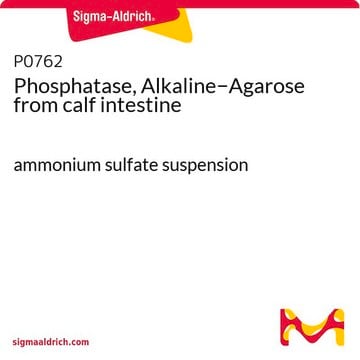P4069
Phosphatase, Alkaline from Escherichia coli
buffered aqueous glycerol solution, 20-50 units/mg protein (in glycine buffer)
Synonyme(s) :
Orthophosphoric-monoester phosphohydrolase (alkaline optimum)
About This Item
Produits recommandés
Source biologique
Escherichia coli
Niveau de qualité
Forme
buffered aqueous glycerol solution
Activité spécifique
20-50 units/mg protein (in glycine buffer)
Activité étrangère
DNase, RNase, none detected
Température de stockage
−20°C
Vous recherchez des produits similaires ? Visite Guide de comparaison des produits
Application
- in fluorometric assay to determine its enzyme activity
- in the dephosphorylating enzyme cocktail for dephosphorylation of peptides
- in treating the nerve and HL60 cell lysate for β-hydroxy β-methylglutaryl-Coenzyme A (HMG-CoA) reductase activity
Actions biochimiques/physiologiques
Attention
Définition de l'unité
Forme physique
Remarque sur l'analyse
Inhibiteur
Produit(s) apparenté(s)
Substrat
Mention d'avertissement
Danger
Mentions de danger
Conseils de prudence
Classification des risques
Resp. Sens. 1
Code de la classe de stockage
10 - Combustible liquids
Classe de danger pour l'eau (WGK)
WGK 1
Point d'éclair (°F)
Not applicable
Point d'éclair (°C)
Not applicable
Équipement de protection individuelle
Eyeshields, Gloves, type N95 (US)
Certificats d'analyse (COA)
Recherchez un Certificats d'analyse (COA) en saisissant le numéro de lot du produit. Les numéros de lot figurent sur l'étiquette du produit après les mots "Lot" ou "Batch".
Déjà en possession de ce produit ?
Retrouvez la documentation relative aux produits que vous avez récemment achetés dans la Bibliothèque de documents.
Les clients ont également consulté
Notre équipe de scientifiques dispose d'une expérience dans tous les secteurs de la recherche, notamment en sciences de la vie, science des matériaux, synthèse chimique, chromatographie, analyse et dans de nombreux autres domaines..
Contacter notre Service technique







